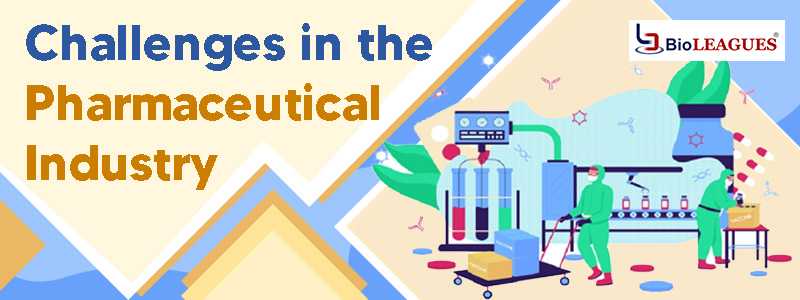In 2018, the global pharmaceutical industry spent an estimated one hundred and fifty billion dollars on R&D. Sales and profits however proceeded to decrease. Although most manufacturing sectors have adopted technologies to come up with innovative manufacturing processes and methodologies to improve sales and enhance productivity, many pharma production companies are still straggling behind in adoption.
Key Challenges Facing the Pharmaceutical Industry
Detailed below are a few of the biggest challenges that the pharma sector is grappling with.
- The Development Of New Drugs
As the industry has already largely found cures, it is becoming increasingly difficult to control disease. Incurable diseases like Alzheimer’s disease and cancer still find ways to beat the best researchers and scientists.
Have you made some headway in drug innovation? Then get your findings published in a highly reputed Scopus indexed journal immediately.
- The Ever-Evolving & Developing Demands Of Patients
The more successful a pharmaceutical company, the more problems it begins to pile up. Customers now want more deals, better medicines and cheaper drugs. The pharmaceutical industry faces competitive trade disputes as consumers become increasingly aware and unforgiving. Patients want better treatments and therapies that use more efficient drug delivery systems, at more affordable prices.
- The Steady Decline In Scientific Innovation & Productivity
The last ten years have seen inconsistency in drug research, which is quite discouraging. Most Big Pharma players are unable to come up with productive research that leads to successful drugs. For drug production to emerge from such a crisis, we will need significant gains in terms of scientific productivity.
- Inefficient Management & Outdated Marketing Techniques
Another significant concern for the pharma industry is the vicious and competitive cycle of marketing and management. Such a culture that focuses on maximizing profit does not complement scientific research and discovery.
- Increasingly Aware Patients
More than ever, consumers now have the ability to make informed buying decisions about the drugs they wish to purchase. Earlier, it was hard to find reliable sources of information; the internet has made it easy, allowing consumers to know what they want. These people also look at the statistics of the pharmaceutical companies and ask for better prices, which leads to other problems for the industry.
The forthcoming international pharmaceutical conference in Thailand will go over this phenomenon in detail.
- High-strung Intellectual Property Rights Laws
Emerging nations still struggle to impose intellectual property rights and patent protection. Several markets also give preferential treatment to manufacturers of generic drugs, making things more difficult for companies that focus on research.
- The Many Perils Associated With Self-Medication
More people are starting to think that they know more than their doctors. Research has shown that self-medication through Google is at an all-time high, leading to an upsurge in over-the-counter drugs.
The upcoming pharma conference 2025 is a great event to partake in if you want to find out in detail about every one of the challenges tormenting the global pharma sector.
Challenges in Pharmaceutical Research
The pharmaceutical research industry is currently encountering a variety of increasingly complex challenges. Today, in fact, the discovery and commercialization of innovative drugs are linked, not only to –
- the ability of companies to resolve relatively basic and traditional difficulties which have changed profoundly in recent years (such as regulatory constraints, dramatic development costs, the critical mass required for investments, development times and the protection of innovation, human resources and the organization),
- but also to the acceptance of recent factors that the research pharmaceutical industry must imperatively overcome (such as new research channels and in particular biotechnologies, the construction of a pharmaceutical Europe and the internationalization of molecules, the needs of the Third World, the financing of innovation and the control of health spending, the evolution of public opinion expectations in matters of ethics and the environment).
The pharmaceutical industry is currently in a phase of upheaval during which it will undergo profound changes, both in its activities and in its relations with its environment. Over the past few years, the abundance of data sources has offered pharmaceutical companies unprecedented opportunities to collect vast sets of information about patients, disease traits and effective treatment methodologies.
Nevertheless, around sixty percent of health studies are now scattered over thousands of siled or incomplete sources, and around fifty percent of historical scientific data is no longer publicly available. This is valuable information that can help medical affairs departments make better decisions. However, the sheer volume of research currently available can present significant obstacles to progress.
Detailed below are four of the main challenges facing pharmaceutical companies looking to leverage big data –
- The need for qualified professionals,
- The need for new technologies and analytical methods,
- The difficulty inherent in the data itself,
- The reluctance to invest.
The wealth of information generated by modern technologies offers pharma companies never-before-seen opportunities to acquire more knowledge about disease traits, clinical findings, and distinct patient groupings. Albeit, there are also unprecedented challenges to overcome, especially when it comes to developing skilled researchers and the required tools they need to make quality analysis possible. The problems inherent in the data itself as well as the initial investment costs to achieve it also present obstacles that the pharmaceutical industry will have to overcome to be able to take full advantage of all the new information at its disposal.




